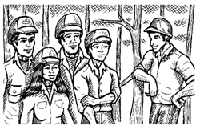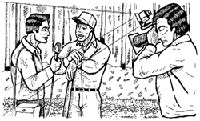Principles of Forest Stewardship
Lesson Six - Public Awareness
The public has become more aware and concerned about the environment. People expect forests to provide clean water, habitat for wildlife and places to picnic, hike and camp. There are multiple users of our forests and when a use or resource is threatened people become concerned. The public may go as far as to lobby elected officials or go to the media if the you feel strongly about an issue. This can lead to new legislation which can change the way we use a resource. Sometimes these new laws or regulations can be for the good. However, concerns are sometimes raised out of lack of knowledge. That's why it is important for the forest industry to help promote public awareness and knowledge.
Although you as an individual may not have the opportunity to influence a lot of people, we as a group can have a big impact. If all individuals in the industry work together and do our little part a large change can be made. Participating in public awareness does not necessarily mean hiring a media consultant or having a large advertising budget. It can be many little things that individuals do day to day. For example one of the biggest complaints contractors hear from the public is garbage or litter left on the site. It is a small effort to make sure all litter is picked up after an operation, but it goes a long way in public relations.
Other common problems are damage to roads and trails caused by heavy machinery, blocking access to walking trails and roads and excessive noise of heavy machinery late at night or early in the morning. Solutions to most of these problems are usually very simple. If you are near houses try to reduce the time heavy machinery operates in the early morning or late evening. If you know people walk a certain trail, keep it clear. The solutions are simple but you have to be aware of your surroundings. An effort has to be made to observe where your working and think about other users of the forest. It boils down to attitude.

Some contractors and landowners go the extra step by making sure the site is pleasing to look at. For example, leaving an uncut tree buffer along a busy road or leaving some trees standing in a clearcut to break it up. Signs at the operation site indicating who is doing the work are helpful not only for safety reasons but also to demonstrate a willingness to show your work.
At times you will get inquiries from neighbors and interested people. Your attitude and your employees attitude with these people may influence how they perceive forestry. If they are treated brusquely they may feel you are trying to hide something. This feeling is often transferred to the whole forestry industry.
If you are part of a company you may want to consider having a process to deal with public inquiries. It can be something as simple as having someone designated to respond to inquiries. However, you should make sure that all employees are aware of the process. Also, employees should be able to respond to some questions about the operation and environmental protection. Employees are on the front line and often the first contact with the public. It is also sometimes helpful to have written information available to hand out to people. It can be something as simple as a copy of the Forest Stewardship Principles.
The following are some tips to help you when meeting with a member of the public:
- be friendly and sincere
- keep business cards handy
- if you can't answer a question, take their name and number and get back to them later
- remember their attitudes are based on their own past experiences
- be enthusiastic
- try to remember names
- be professional confident
- don't use jargon
- take them to the woods if you can
- leave documents about who you are and what you do
At some time you may find yourself being interviewed by the media. It can be very stressful, but can also be a great opportunity to get across your message. 
Here are some tips to help you deal with the media:
- ask of a list of questions before being interviewed
- try not to be defensive or evasive
- be straight forward, honest and sincere
- if on camera, keep eye contact with the interviewer
- relax, be calm, don't get angry
- don't say "no comment", it's better to say "legal considerations", "competitive" or "ethical reasons"
- remember everything is "on record"
- speak plain, don't use jargon
- ask for more information if needed
- don't be afraid to say "I don't know"
- try to find 2 or 3 key points worth making and repeat them whenever possible
- be professional
- keep to the facts
Exercise 6. Measure Your Public Awareness IQ
You can measure your attitude toward public awareness by taking this test.
Answer yes or no to the following questions:
1. If you were a landowner, would you allow other users to access your land? e.g. hikers, snowmobilers, anglers.
2. When working on a property (your own or someone else's) do you post signs or have signs on your truck?
3. If a member of the general public asked you or an employee why you are leaving a dead tree on the harvest site can you answer the question correctly?
4. If an irritate member of the public asked is on a job site and is being difficult, do you try to deal with them in a calm professional manner or try to ignore them?
5. In the last 12 months, have you done anything to promote public awareness of forestry? e.g. given a talk to Scouts or Guides, written a letter to the editor of your local paper, provided seedlings to an interest group.
6. Is your job site free of garbage and litter when you leave?
7. If someone asks you about information on forest management programs in Nova Scotia, would you have a contact name and number available for them?
8. You arrive at a job site you have just finished, to pick up some equipment. You find somebody has dumped garbage on site. Even though you do not own the property would you clean up the garbage or consider it the landowners problem?
9. In the last 24 months have you attended a seminar, meeting, or workshop that has increased you knowledge of some aspect of forestry (silviculture, forest management, roads, environmental protection, wildlife etc.)?
10. Are you a member of any public interest group that concerns forests e.g. hunting and fishing association, snowmobile club, Scout or Guide leader, environmental group etc.?
